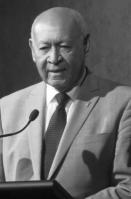Charles Lepani

H.E. Charles Lepani was director of the PNG National Planning Office from 1975-80. He has subsequently worked as an economic consultant and senior diplomat – including, from 2005, as High Commissioner to Australia. He discusses public sector planning and the formulation of macro-economic policy in PNG in the immediate post-independence years.
| Time | Summary | Keywords |
|---|---|---|
| 00:00:00 |
Charles Lepani is welcomed to the interview. |
|
| 00:00:57 |
Charles Lepani discusses his high school education at Charters Towers, Queensland, which he completed in 1966, and becoming part of the second intake in 1967 into the University of Papua New Guinea where he met good friends Rabbie Namaliu, Tony Siaguru, and Mekere Morauta. He discusses the group's growing awareness regarding Independence and well as the sense of political awareness in the first generation of political leaders including Michael Somare, John Guise and his father Lepani Watson. |
Australia, Charters Towers, education, Gang of Four, John Guise, Lepani Watson, Mekere Morauta, Michael Somare, Queensland, Rabbie Namaliu, Tony Siaguru |
| 00:03:05 |
Charles Lepani relates how after going to university in NSW, he received a scholarship from the ACTU to attend the University of PNG through Australian ACTU industrial advocate Bob Hawke who had come to PNG to work with Michael Somare, Reuben Taureka and others in the public service wage case, and Public Service Association executives Paul Munro and Ron Madgwick. The scholarship was for trade unionists, and Lepani relates how he spent time at Bob Hawke's home in Sandringham, Victoria, also meeting Bob Carr, then involved in the NSW Trades Hall Council. Lepani discusses his role in demonstrations against the Vietnam War and for Aboriginal causes while in Australia. |
ACTU, Australian Aborigines, Bob Carr, Bob Hawke, demonstrations, Michael Somare, Paul Munro, Public Service Association, Reuben Taureka, Ron Madgwick, Vietnam War |
| 00:05:16 |
Charles Lepani relates how he was invited to be a participant in a television debate run by the ABC between Charlie Barnes (Minister for External Territories) and Gough Whitlam on PNG Independence at New England University in Armidale. He relates how on returning to PNG he was involved as a trade union activist in the Port Moresby urban minimum wage case and succeeded in increasing the minimum wage from $8 to $13.50 heard by Arbitration Commissioner Len Matthews. |
ABC, Charles Barnes, Gough Whitlam, Len Matthews, minimum wage |
| 00:07:09 |
Charles Lepani states that after working as a union activist he went to head the Bureau of Industrial Organisation at the invitation of Gavera Rea, Minister for Labour, to address issues including employer/employee relations and union involvement in worker's benefits. He relates how he undertook a study tour in 1972 to the more socialist countries Tanzania and Sweden, and the importance placed on Tanzania's model of Independence. |
Gavera Rea, Julius Chan, study tour, Sweden, Tanzania |
| 00:08:46 |
Charles Lepani describes his involvement in the Bougainville Copper Mine strike, and ongoing discussions with Bougainville in the lead up to Independence. |
Bougainville, Ebia Olewali, Tony Siaguru |
| 00:11:24 |
Charles Lepani discusses the issue of reducing and stabilising wages in the public and private sector prior to Independence by those at the National Planning Office and Treasury, without examining the tax policy and profits made by big companies. He describes how he saw the other side of the issue once working at the National Planning Office. |
Chris Gregory, David Beatty, John Langmore, National Planning Office, Ross Garnaut, tax policy |
| 00:13:39 |
Charles Lepani relates how he left the union movement to join the National Planning Office in 1974 and became head of that organisation one year later with a group of expatriate staff from Canada, Australia, and USA. He states that the office planned and developed policies for new expenditure and new priorities. |
National Planning Office, union movement |
| 00:15:16 |
Charles Lepani discusses the budget model in use, and the plan to support subsistence sector agriculture in addition to cash cropping. He discusses the National Development Strategy (nicknamed Little Red Book) and his long-term view of its impact. |
agricultural policy, budget strategy, Little Red Book |
| 00:19:58 |
Charles Lepani discusses mining issues in relation to Ok Tedi and Bougainville and his travel to Germany to look at investment. He discusses the formation of the National Investment and Development Authority in 1976-77 and the role of Treasury in investment, finance and borrowing issues prior to independence. |
investment strategy, Mekere Morauta |
| 00:21:39 |
Charles Lepani discusses the formation and naming of the so-called Gang of Four (Charles Lepani, Rabbie Namaliu, Tony Siaguru, and Mekere Morauta) and the level of control they wielded in finance and spending. He outlines the criteria for priority setting and the individuals involved in determining budget priorities. He discusses the beginnings of the Rural Development Fund. |
China, Gang of Four, Mekere Morauta, Rabbie Namaliu, Tony Siaguru |
| 00:29:14 |
Charles Lepani relates how Josephine Abaijah and a group of women stormed Michael Somare's office protesting about the cost of living in Port Moresby. |
cost of living, demonstrations, Josephine Abaijah, Michael Somare, Ross Garnaut |
| 00:30:25 |
Charles Lepani discusses the relationship between senior levels of the public service and politicians. He discusses the difference between the old cadre of Australian-trained public servants who were conservative on issues such as decentralisation and the new who had the trust of Cabinet. |
diversity, grass roots decision making, Mt Eliza, Sere Pitoi |
| 00:34:23 |
Charles Lepani reflects on the changes in the public sector capacity and the shift of resources to politicians resulting in the disengagment of the public sector, together with the impact of restructuring required by the World Bank. |
public sector |
| 00:36:56 |
Charles Lepani reflects on the changes after Independence and the intake of younger, ambitious ministers who began to challenge the authority of public servants. His discusses the impact of new and recurrent spending in planning capital works projects. He discusses the changing ratio of aid funding for projects. |
capital works, financial aid, Peter O'Neill |
| 00:40:56 |
Charles Lepani discusses the role of the central planning document Papua New Guinea Vision 2050 (Government of PNG, 2009), and the process for setting priorities when he was head of National Planning Office. He discusses the importance of key issues: subsistence sector production, relevance to tradition in business activities, co-operatives and community-based organisations, and decentralisation. He states that the Little Red Book predicted population growth requiring a Population Policy which attracted criticism from the Catholic church. He discusses the development of the compromise child spacing policy and the development of the Nutrition policy to fortify basic foodstuffs. |
Bernard Narokobi, Catholic church, John Langmore, Little Red Book, nutrition policy, population policy |
| 00:44:18 |
Charles Lepani reflects on policy formulation and the close relationship with Cabinet. He discusses the decentralisation policy where McKinsey Consultants were brought in to develop the model based on the Canadian provincial government system which was not, however, resourced. He discusses the development of other priority area including the participation of women, agricultural policy, and how the process of putting these policies before the Cabinet. He reflects on the change caused by moving the National Planning Office away from the Prime Minister or Treasury to become a separate agency. |
decentralisation, Fred Hilmer, McKinsey Consultants, National Planning Office, provincial government |
| 00:47:43 |
Charles Lepani reflects that the national development strategy has become too ambitious ̶ 5, 10 and now 50 years ̶ when based on revenue flow, and refers to the previous 3-year cycle of commodities that allowed him to plan new spending in the budget matched with revenues. |
development strategy, fiscal policy |
| 00:49:48 |
Charles Lepani, as current PNG High Commmissioner to Australia, reflects on the characteristics of Australia's approach to the fledgling government of PNG. He stresses the importance of the Moti Affair and Somare Affair in convincing PNG of the need to reduce Australia's aid. He reflects on Australia's generosity, and also on the need to mature the relationship in the last 15 years as between equals, working mutually and inter-dependantly on economic, trade, investment and people relations. He highlights the absence of a visa-on-arrival agreement as a point of contention. He discusses the funding agreement over Manus Island and the reduction in aid package and rebalancing once the Liquid Natural Gas project comes in. |
Australian aid, European Union, Indonesia, Japan, Kevin Rudd, Manus Island, Michael Somare, Peter O'Neill |
| 00:54:54 |
Charles Lepani discusses the role of expatriates and local Papua New Guineans in the National Planning Office and the efforts to recruit economists and political science graduates to the Office. He relates how they developed policy as a team, but that it was he who took the policies to Cabinet. He discusses the case of Air Niugini planning to buy new jets that needed airports that could accommodate them when his priority was to maintain existing airports and build feeder roads. He describes his fight with Air Niugini chair Bart Philemon and Lepani later admitting that he had been wrong as the jets became the workhorses of the country. |
Air Niugini, airports, Bart Philemon, expatriates, John Langmore, National Planning Office, Ross Garnaut |
| 00:58:45 |
Charles Lepani discusses the role of Ross Garnaut in developing the budget suppport grant. He describes how Lepani, Tony Siaguru and others accompanied minister Sir Albert Maori Kiki to Sweden to meet Prime Minister Olof Palme. He discusses the process where Garnaut developed the policy and Mekere Moratau took it to Julius Chan who then asked Garnaut for his opinion before taking it to Cabinet. |
Albert Maori Kiki, Julius Chan, Mekere Morauta, Ross Garnaut, Tony Siaguru |
| 01:01:35 |
Charles Lepani reflects on the mood and general sense of optimism and enthusiasm in the country at Independence. He describes borrowing a Malayasian model of a national coordination centre for planning with Cabinet and the level of cooperation between Cabinet, politicians and bureaucrats, that he claims has not been the case since. |
Cabinet, coordination centre, independence |
| 01:03:55 |
Charles Lepani discusses the confidence at Independence and relates an anecdote when the visiting Sir John Crawford congratulated the group in 1978 post Independence. |
independence, John Crawford |
| 01:05:21 |
Charles Lepani discusses the time between when he was appointed to the National Planning Office and when he returned from further study at Harvard as bookends to an era. He relates how he resigned from his position as head of the Office, but not from the public service when he went to Harvard in 1980 to study for a Masters at the Kennedy School of Government and that on return he was informed by Julius Chan that he was no longer required. He states that he established a consultancy firm for 8 years followed by time at the Pacific Islands Development Program at the University of Hawaii. |
Harvard, Helen Hughes, Julius Chan, National Planning Office |
| 01:09:00 |
Charles Lepani discusses the impact of the change in the relations between the public service and politicians. He discusses the importance of his youth (28 at Independence) and the youth of his cohort and their connections to each other through schooling and university ties. |
Philip Bouraga, Sere Pitoi |
| 01:12:10 |
Charles Lepani reflects on his 40 year contribution to public life, now as High Commissioner to Australia and the importance of his historical knowledge of policy development in his role as ambassador. |
diplomacy |
| 01:13:02 |
Interview ends |
Biography

Charles Lepani
H.E. Charles Lepani
A Trobriand Islander, Charles Lepani completed his secondary education in Charters Towers, Queensland, from 1961-66. He began a Bachelor of Arts degree at the University of Papua New Guinea (UPNG) in 1967-68 and then won a scholarship, jointly sponsored by the Australian Council of Trade Unions and the PNG and Australian Public Service Associations, which enabled him to undertake a Bachelor of Commerce at the University of New South Wales from 1969-71, and to gain work experience with Australian trade unions during university breaks. He returned to complete his UPNG degree in 1972.
Charles worked for a period at the PNG Public Service Association, and then moved to the National Planning Office in 1974. He became director of this office in 1975, and served in this position until 1980. He was one of the so-called “Gang of Four” along with Merere Morauta, Rabbie Namaliu and Tony Siaguru – civil service leaders who led the formation of public administration and public policy in the immediate post-independence years.
In 1980 Charles Lepani left for Harvard University, where he obtained a Masters degree in public administration from the Kennedy School of Government. Lepani worked subsequently as an economic consultant.
Charles Lepani represented PNG as Ambassador to the European Union from 1991-94, and was managing director of PNG’s Minerals Resources Development Company from 1994-96. He then became Managing Director of the Orogen Minerals company in 1997.
Charles Lepani was appointed as PNG High Commissioner to Australia in 2005.
Copyright © Papua New Guinea National Museum & Art Gallery, 2025
The copyright holder of this material grants users permission to access the material on this website for the following purposes only: research and study, education, other non-commercial and non-public uses.




